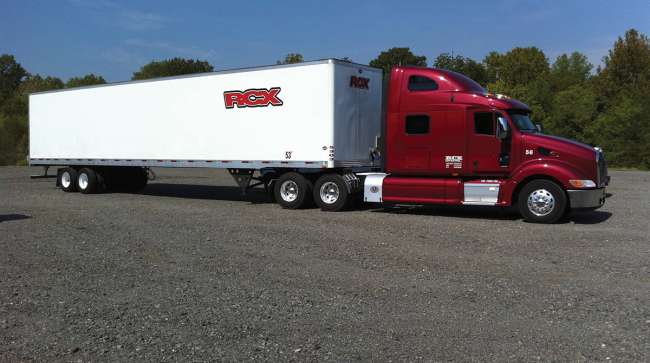Senior Reporter
Arkansas Carrier Forced to Close After Multimillion-Dollar Ruling

[Stay on top of transportation news: Get TTNews in your inbox.]
Over Valentine’s Day dinner last year, Randy Clifton and his wife, Karyn, decided the fate of the trucking company that had been Randy’s pride and joy for a decade.
The odds were stacked against the third-generation trucker. That same month, the bank froze his credit line and his insurance costs doubled, the result of a multimillion-dollar jury verdict for a 2015 accident involving a truck and driver for a motor carrier that Clifton’s company, RCX Solutions Inc., had brokered with to haul a load of cosmetics in an RCX trailer.
“We agreed, we’re done,” Clifton said of the couple’s fateful dinner discussion about the years-long legal battle over the incident. “We fought it, we’re tired of it. We’re just going to have to shut it down.” He added, “We had truck driver families, and 12 people in the office. That one accident affected a lot of people.”
The carrier closed down March 1, 2020.
The story of Little Rock, Ark.-based RCX is similar to those of other motor carriers hit with whopping jury verdicts, many the result of skillful plaintiff attorneys who portray carriers as the villains.

Clifton (Randy Clifton)
“The accident wasn’t even with our truck. It wasn’t our driver,” Clifton said. “It was just our trailer.”
Last year, an American Transportation Research Institute study of 600 truck accident lawsuits confirmed a sharp rise in what are commonly called “nuclear” jury verdicts, defined as those of more than $10 million. The study concluded that such large damages assessed against truckers have been on a steep rise since 2010. In fact, from 2010-2018, the average size of jury verdicts in trucking trials rose from $2.3 million to $22.2 million — an increase of 967%, according to the study.
In Clifton’s case, before even going to trial his attorney set aside a $1 million reserve. “It looked like we had a $1 million accident before it got to court,” he said.
It wasn’t. After the trial, the jury awarded the victim and his wife $23 million. That finding was adjusted to $7.5 million on appeal, and RCX’s insurance company paid $1 million of the damages.
The remaining $6.5 million was enough to send RCX into a tailspin, Clifton said.
“When you fight so hard for something for 10 years, you really want to make it work,” Clifton said. “That was our retirement. My plan was to build the company up to 150 trucks and sell it.”
Clifton’s troubles began when one of his trucks broke down in San Antonio. Anxious to get the load to its Little Rock destination, Clifton did a trailer swap deal with a small carrier, About Tyme Transport Inc., to pick up his empty trailer in San Antonio, load it in Brownsville, Texas, and deliver the load back in Arkansas.
According to court documents, the driver for About Tyme, apparently distracted while on a Bluetooth headset device, crossed the median and hit a pickup truck near Refugio, Texas. The truck driver, Ronald Brown, was killed, and the driver of the pickup, Alexandro Puga, suffered a variety of injuries, including burns and fractures in his spine, legs, pelvis and fingers.
“The accident was very traumatic and heartbreaking,” Clifton recalled of the 2015 incident. “The truck driver killed in the accident was a dad with three kids. It was just a horrible situation all the way around.”
The 2017 trial took place in a federal district court in Corpus Christi, Texas. The jury ordered RCX to pay Puga and his wife $23 million in damages, but RCX in an appeal argued it should not be liable for an accident caused by another motor carrier hauling its trailer. RCX also said the federal district court should have given it credit for an earlier settlement between itself and About Tyme Transport.
Although a three-judge panel for the 5th U.S. District Court of Appeals refuted RCX’s legal arguments, it said the judgment was excessive and reduced it to $7.5 million.
Court documents state that RCX leased the trailer involved in the accident from another company, Xtra Lease, and that RCX assumed responsibility for the trailer’s operation under the lease agreement. RCX had a trailer interchange agreement with About Tyme.
A brokerage firm, Sunset Transportation, had brokered the load to RCX for cosmetics manufacturer L’Oreal. In its February 2019 opinion, the appeals court wrote, “In its role as a broker, Sunset was responsible for choosing a motor carrier for individual L’Oreal shipments on a load-by-load basis. Sunset chose RCX to transport the L’Oreal load involved in the accident.”
The jury in the earlier case also determined that since RCX used motor vehicles to transport property, it was, by definition, a motor carrier. The jury also determined that RCX did not act as a broker to About Tyme.
Clifton said that during the trial, the plaintiff’s attorney likened About Tyme to an independent owner-operator working for RCX.
“It seems like lawyers nowadays take more psychology courses than law courses on how to bend a jury’s mind,” Clifton said. “You’re the big bad trucking company. It’s really amazing how they can turn you into the bad guy. They make it look like you’re just out for money. They’re really good at it.”

Even before the pandemic, DHL's Larry S. Onge and Jim Monkmeyer set up strategies and implemented technology in order to respond to disruptions. Now, they know exactly how to get the vaccine from point A to point B — and, better, how to do it at a global scale. Hear a snippet, above, and get the full program by going to RoadSigns.TTNews.com.
He added, “We counted 13 attorney trucking billboards on the way to court from the hotel each day. Each one said ‘I won my client X million dollars in a trucking accident.’ There were billboards all over South Texas.”
The accident devastated RCX.
Clifton now works as a Little Rock-based broker agent for Sunset Transportation. Since the remaining $6.5 million of the total judgment remains on the books, in January he filed for Chapter 7 voluntary liquidation bankruptcy. RCX has 40-plus unsecured creditors but has no means to pay them, with an estimated total debt “between $1 million and $10 million,” according to documents filed in U.S. Bankruptcy Court for the Eastern District of Arkansas.
The bankruptcy file noted that RCX had revenues totaling $14.9 million in 2018, $12 million in 2019, but only $1.3 million in the first two months of 2020.
With freight rates “beginning to go through the roof,” and the driver shortage getting worse, Clifton said that trucking is a business that gets more challenging every day.
“Our economy is really based on cheap freight,” he said. “You got so many carriers that are going out of business. We don’t have a new driver pool to choose from like we used to, and older drivers are getting out. If we only have a limited number of trucking companies out there, you’re not going to be able to control freight costs.”
Clifton said he and his wife are now working on a Plan B for retirement. “We’re doing OK,” he said.
During a series of webinars on nuclear verdicts hosted last year by American Trucking Associations, trucking defense attorney Doug Marcello, of Carlisle, Pa., discussed Clifton’s case.
“Randy and thousands like him will get up on a perfect day, buy a company, accept the risk of being an owner of a business, provide jobs to employees, and support for their community,” he said. “They are who we owe an aggressive defense of trucking cases and nuclear verdicts, to protect them from this type of thing. That is the true cost of nuclear verdicts.”
Want more news? Listen to today's daily briefing below or go here for more info:




